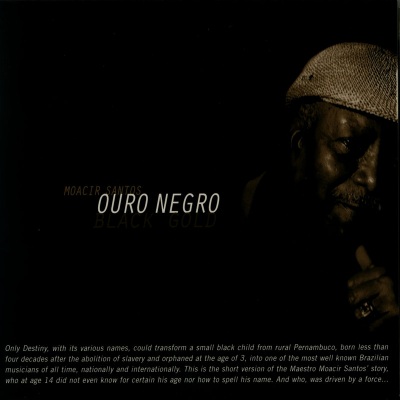
Ouro Negro
by Richard S. Ginell Even seasoned devotees of Brazilian music may not recognize the music of Moacir Santos. This Bahian-born composer/saxophonist/conductor toiled in the radio and film studios of Brazil and passed on musical knowledge to a plethora of Brazilian musicians before moving to Los Angeles in 1967, where he taught music and composed more film scores. Since then, he had been apparently overlooked in Brazil as the Jobims , Gilbertos , and other individuals and dynasties carried the flag for their country. Deciding to do something about this situation while Santos was still alive (he was 74 at the time), saxophonist Ze Nogueira and guitarist Mario Adnet organized this series of supersessions on two CDs, mostly re-creating instrumental selections from Santos' recordings originally made from 1965 to 1992. Ney Lopes was commissioned to provide lyrics for some of the selections, and the producers rounded up a star-studded cast of Brazilian singers to pay tribute -- including Milton Nascimento , Djavan , Gilberto Gil , João Bosco , and Ed Motta , who appear on one track apiece -- and Santos himself contributes his own modest voice to a few selections. Brazilian electric guitarist Ricardo Silveira is also present on several tracks. For all of this care and feeding of these smoothly executed charts for a midsized group of reeds, brasses, rhythm section, and percussion, not much of real distinction emerges from this tribute. The music is obviously well-crafted yet rather glib and unmemorable -- not unlike most film or background music -- laced with competent jazz breaks, and often watered-down Brazilian rhythms, always melodic with a few dissonant undercurrents. The tune entrusted to Gil , "Maracatu, Nacao do Amor," is a good one, and "Nana" has a lazy bluesy line scored for trombone. Yet nothing else triggers any emotional reaction one way or another. In a revealing anecdote, Santos recalls hearing a Top Ten tune on a car radio in Los Angeles in 1975 and thinking, "I could write a dozen of these an hour!" One wouldn't doubt it, but from the evidence of the music here, would you trade all of this facility for, say, the first few notes of "Desafinado"? In a minute.
